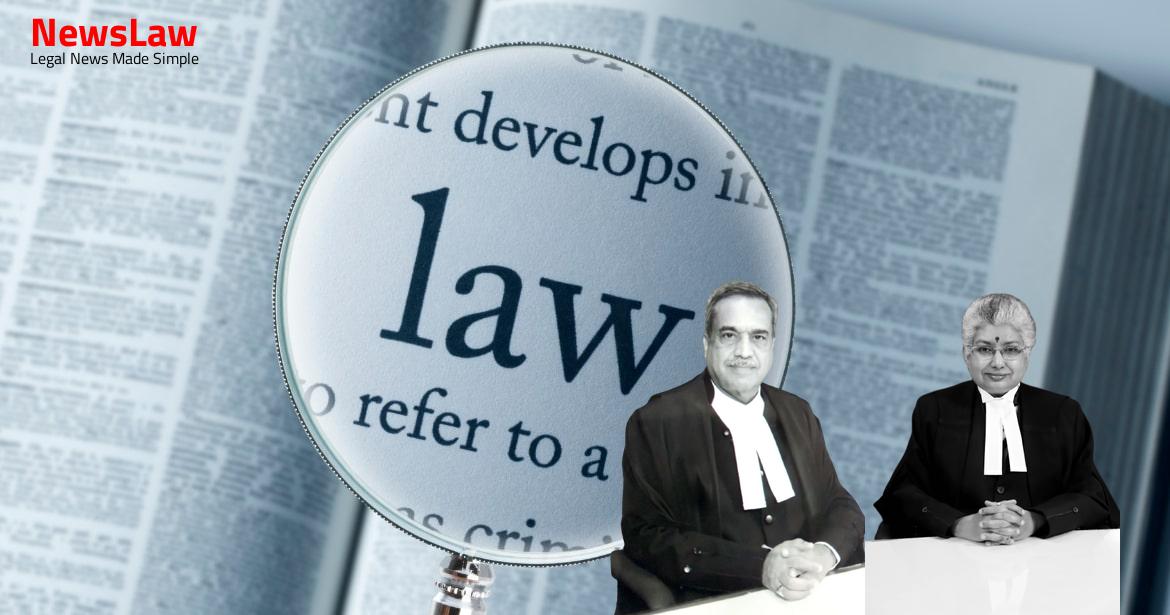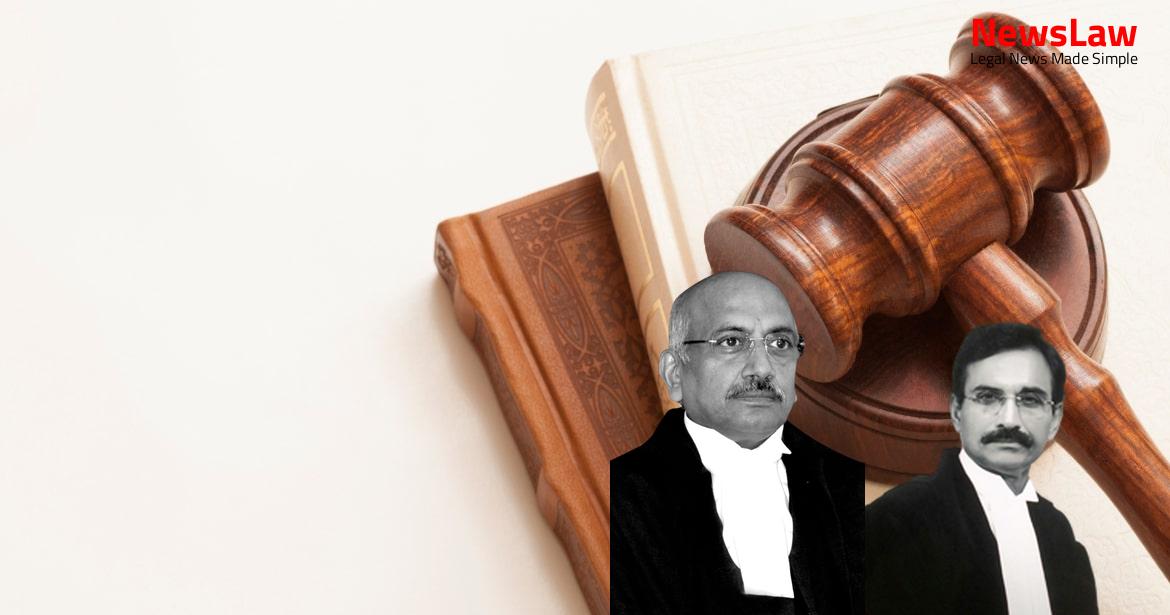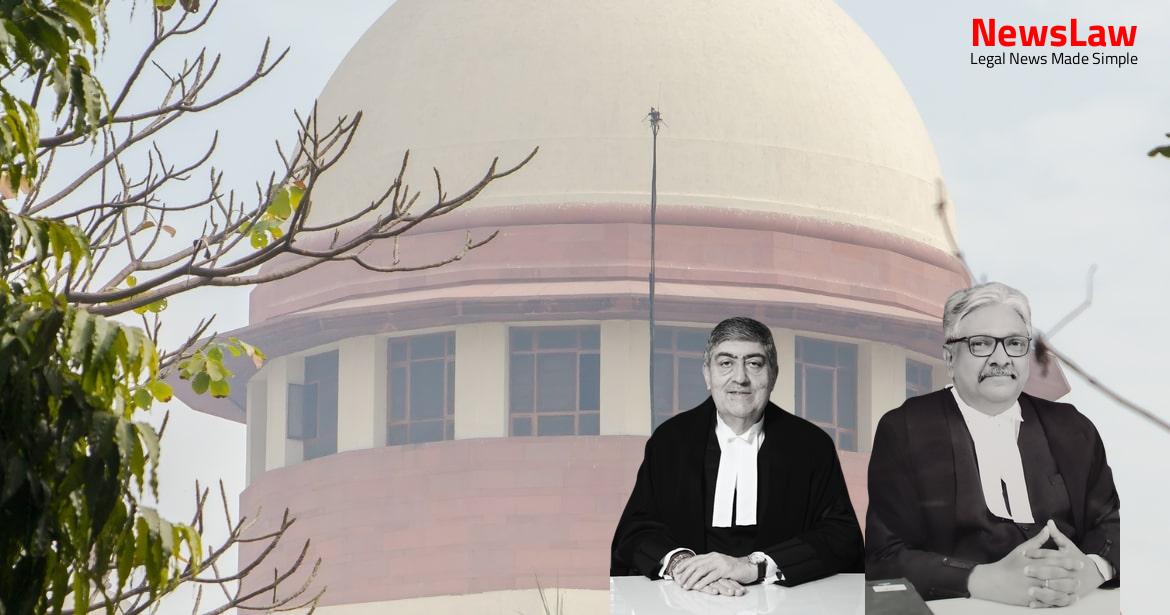Exploring the nuances of a legal case revolving around partition validity in a family property dispute. The focus is on the court’s in-depth analysis of registration requirements for arbitral awards that dictate property divisions. Stay tuned to unravel the complexities of this intricate legal scenario.
Facts
- Late Periyaiya Servai, the first and second defendants, and Marimuthu had partitioned the properties in 1964 and were enjoying them separately.
- A will dated 26th January, 1994, bequeathing one-fourth share to the plaintiff, was deemed invalid as Periyaiya Servai had no right to execute such a will after the partition.
- The second appeal No. 37 of 1993 concluded that Periyaiya Servai had no share in the property after the 1964 partition.
- A legal notice objecting to the plaintiff’s share in joint family properties was sent by the first defendant before further legal proceedings.
- The District Munsiff Court dismissed the suit filed by the plaintiff, stating that late Periyaiya Servai was disqualified from making a will on ancestral properties.
- Allegations of Periyaiya Servai being mistreated and the will being concocted during his ill health were made by the defendants.
- The presence of partition deed in 1964 dividing the properties between the defendants and Marimuthu was emphasized.
- The first defendant contended that the suit for partition was vexatious and not maintainable based on prior legal judgements.
- Various legal actions and appeals were mentioned, demonstrating the complex legal history of the case.
- The Trial Court held that the decree in A.S. No 37 of 1993 would be enforceable over the decree in O.P. No 7 of 1992.
- No appeal had been preferred against the decision of the Trial Court, leading to the finality of the finding regarding the partition.
- The instant suit was found to be barred by the principle of res judicata.
- The High Court remanded the matter to the first appellate court to focus only on determining the nature of the properties.
- The first appellate court found that lack of individual pattas for the defendants’ shares did not affect the validity of the partition done by Periyaiya Servai in favor of his sons.
- In O.S. No 347 of 1991, it was decreed that each son of Periyaiya Servai would be entitled to one-third share of the properties.
- In A.S. No 37 of 1993, the first appellate court confirmed a valid partition in 1964 where each son was entitled to one-third share.
- The High Court relied on the findings of Appeal Suit No 37 of 1993 that all joint family properties had been divided into three shares for the sons of Periyaiya Servai.
- The High Court confirmed that the suit schedule properties are joint ancestral properties.
Also Read: Analysis of Tax Exemption for Enemy Properties
Issue
- The substantial questions of law raised by the Plaintiff in the second appeal were dismissed.
- The questions included whether the suit was barred in light of a specific direction by the High Court and the applicability of section 11 of the Code of Civil Procedure.
- The main consideration was whether the suit filed by the plaintiff was barred based on the judgment and decree in A.S. No. 37 of 1993.
Arguments
- Appellant contends that the High Court and lower courts erred in dismissing the suit based on a prior partition in 1964, as per the appellant, no such partition took place.
- Appellant claims to have a share in the suit property through a will executed by his grandfather.
- Appellant argues that the finding of partition in 1964 by the first appellate court should not have been considered final as it was outside the scope of the remand order.
- Appellant states that the arbitral award, which the partition was based on, was not registered and therefore not legally binding.
- Appellant challenges the dismissal of the suit based on the principle of res judicata, claiming that a fresh suit for partition was valid.
- Appellant argues that registration of the arbitral award was not mandatory and that the partition did not create legal rights without proper registration.
- Appellant suggests that the High Court’s decision to dismiss the appeal and the suit was correct.
- Various case laws were cited by both sides to support their arguments.
- The award in question did not require registration as per the counter argument by learned counsel for the respondent.
- In the case of Shiromani and Ors. v. Hem Kumar and Ors., it was discussed whether a partition deed’s validity could be challenged for not being registered as mandated under Section 17 (1) (b) of the Act.
- The conclusion was that the document in question fell within the ambit of Section 17 (1) (b) due to specific properties being allotted to individual coparceners.
Also Read: SC Clarifies: Choice of Depreciation Method Allowed Until Return Filing
Analysis
- The judgment in O.P. No 7 of 1972 stated that the award was not registered as required under the Act and could not be made a rule of the Court, but this was deemed incorrect in the current case.
- The award from the panchayat was viewed as a future arrangement for dividing properties rather than a formal deed of partition, exempting it from registration under the Act.
- The document in question did not create specific rights in family properties but outlined actions to be taken in the future based on a family arrangement.
- A.S. No. 37 of 1993 found that a partition of properties had occurred in 1964, a decision that was considered final and binding, making a subsequent suit for the same relief not maintainable.
- The distinction between Section 17 (2) (v) and (vi) was highlighted, emphasizing that documents creating interests in specific properties require registration while those outlining future steps do not.
- The judgment reiterated that compromises recognizing existing property rights among heirs do not require registration under the Act.
- The award by the panchayat was viewed as a memorandum of understanding for future actions rather than a legal document creating immediate property rights.
- The adherence to the partition decision from 1964, which had become final, precluded the appellant from filing a new suit for partition, citing the principle of res judicata .
- In A.S. No 37 of 1993, it was held that the suit properties were joint family properties and there was a partition in 1964 between the members of the joint family.
- The award in question needs to be assessed for its impact on creating, declaring, assigning, limiting, or extinguishing rights in immovable property valued at one hundred rupees or more to determine if it requires compulsory registration.
- The High Court observed that the stamping on the award was proper, and registration was not needed as the award did not create new rights in the immovable property but merely recognized existing rights between the parties.
- The judgment in Lachhman Dass v. Ram Lal emphasized the significance of proper stamping and registration for an arbitrator’s award to be enforceable by the Court.
- In the case of Satish Kumar v. Surinder Kumar, the issue of compulsory registration for an award partitioning joint family property exceeding Rs. 100 value was highlighted.
- The conclusion was that an award affecting rights in immovable property valued over Rs. 100 required registration.
- Additionally, the agreement contained in a family settlement does not necessarily need registration, as it primarily focuses on resolving disputes and maintaining family harmony.
- The plea of res judicata does not arise in the instant case based on the judgment of Asrar Ahmed v. Durgah Committee, Ajmer, AIR 1947 PC 1.
- A finding given by a lower court, even if based on sufficient evidence, is not binding between the parties if it is erroneous, as per the principle of res judicata.
- An appeal was filed before the Madurai Bench of the Madras High Court (S.A. No. 92 of 2007) against the dismissal of the initial appeal, which was also dismissed by the High Court.
- Section 17 of the Indian Registration Act specifies documents that must be registered for properties located in specific districts.
- Documents that create, declare, assign, limit, or extinguish rights in immovable property of 100 rupees or more must be registered.
- Certain documents, not involved in creating or affecting property rights, are exempt from registration requirements.
- The High Court affirmed the judgments of the First Appellate Court and Trial Court.
- The suit filed by the appellant was dismissed.
Decision
- Costs of the appeal will be borne by each party individually
- The appeal is dismissed
- The judgment being challenged will remain unchanged
Case Title: K.ARUMUGA VELAIAH Vs. PR.RAMASAMY AND ANOTHER (2022 INSC 103)
Case Number: C.A. No.-002564-002564 / 2012



